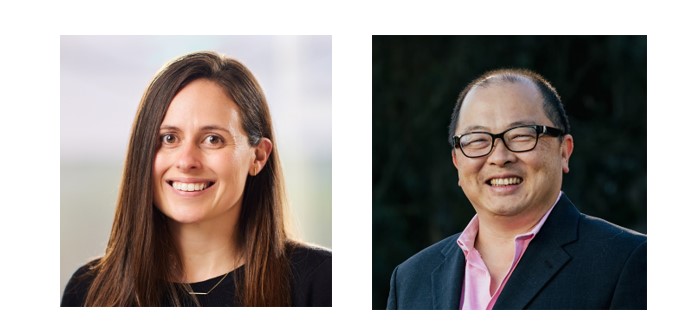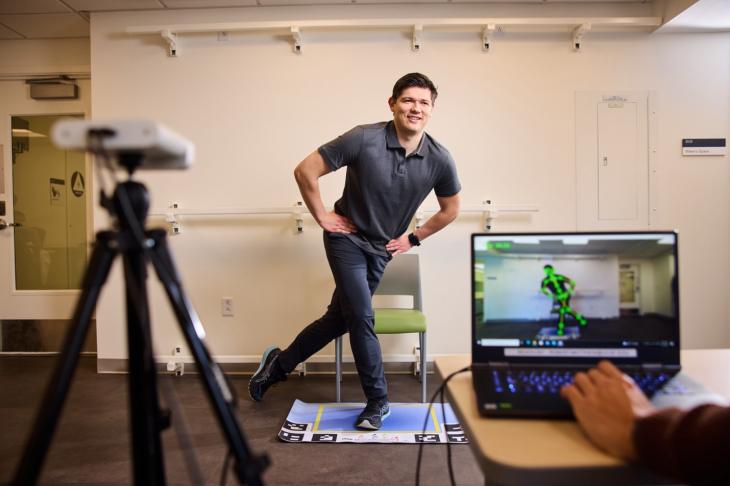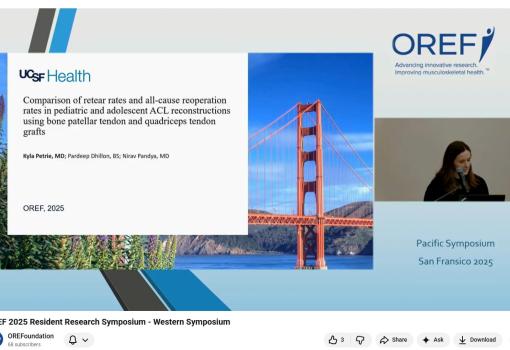Researchers at the UCSF Digital Orthopaedic Biomechanics Lab on the Parnassus campus in San Francisco are working on innovative approaches to assess musculoskeletal patients and predict their response to treatments and surgery. The lab’s interdisciplinary team of scientists, engineers, and clinicians focuses on developing MRI biomarkers, in-clinic and remote biomechanical assessments using sensors and marker-less motion capture, and analytical tools for tracking patient recovery. (Photo: UCSF Department of Orthopaedic Surgery)
SAN FRANCISCO, Dec. 3, 2024 — In a major advancement for patient recovery research, Associate Professor Jeannie Bailey, Ph.D., Director of the Digital Orthopaedic Biomechanics Lab, and Dr. Bobby Tay, M.D., chief of the UCSF Orthopaedic Spine Service, have been awarded a $1 million gift to support the development of digital tools designed to track and predict biomechanical recovery following surgery. This work leverages 3D skeletal tracking data collected from videos and multidomain health data collected using smartwatches. The gift, provided by the Guzik Foundation, aims to improve patient outcomes by enabling accurate, data-driven recovery insights.
The project focuses on creating digital applications capable of monitoring key recovery metrics and generating predictive insights to guide post-operative care. “With this funding, we’ll be able to bring to life tools that support both patients and healthcare providers in navigating the critical stages of biomechanical recovery,” said Dr. Tay, who specializes in spine surgery. “The ability to predict and track recovery offers significant potential to improve outcomes, bringing patients back to active life more safely and efficiently.”

Associate Professor Jeannie Bailey, Ph.D., left, and Dr. Bobby Tay, M.D., chief of the UCSF Orthopaedic Spine Service, have received a $1 million gift to advance digital tools for tracking and predicting patient recovery after surgery.
Dr. Bailey, an expert in biomechanics and digital health, emphasized that collaboration was key to securing the donation. “By merging clinical expertise with advanced biomechanical research, we’re developing solutions directly aligned with patient needs,” she said. The biomechanical assessment algorithms and initial mobile application were developed as part of an ongoing research collaboration between Dr. Bailey and Dr. Ryan Halvorson, M.D., to track and predict patients’ return to sports. The work has expanded into post-operative biomechanical recovery for spine and other orthopaedic patient populations.
Dr. C. Benjamin Ma, M.D., chair of the UCSF Department of Orthopaedic Surgery, highlighted the importance of MD-Ph.D. collaboration in achieving meaningful advances. “This project is an ideal example of how clinical insights combined with research-based strategies can drive impactful results in patient recovery,” Dr. Ma said. “When our clinical and research experts work hand in hand, there’s no limit to the advancements we can achieve. This successful effort will hopefully serve as a model, inspiring more M.D.s and Ph.D.s to join forces on high-impact research.”
In acknowledging the gift, Dr. Bailey and Dr. Tay also expressed gratitude to the Guzik Foundation for recognizing the importance of supporting translational research. “This donation empowers us to focus on translating research into practice,” they said in a joint statement.
The team has already begun developing these digital tools, with early testing of their mobile application on patients anticipated by January 2025. The announcement has generated excitement throughout the department, underscoring the potential of interdisciplinary collaboration to drive innovation in patient care.
For more information on this research initiative, contact Dr. Bailey at the UCSF Digital Orthopaedic Biomechanics Lab.
###



